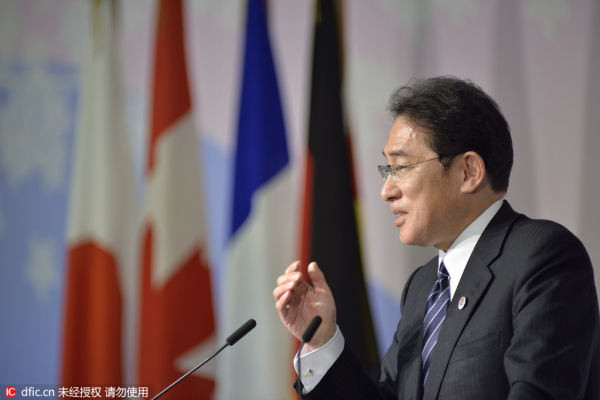Tokyo should not try to lead Manila astray
Updated: 2016-08-11 07:47
(China Daily)
|
|||||||||
 |
|
Japanese Foreign Minister Fumio Kishida gestures during a press conference at the International Media Center in Hiroshima, Japan on April 11, 2016 after Foreign Ministers meeting of G7 countries visit the Peace Memorial Museum. [Photo/IC] |
Both Beijing and Manila have kept a low profile over the visit of former Philippine president Fidel Ramos to the Hong Kong Special Administrative Region in the past couple of days, but his mission has been evident: to seek the possibility of easing the strained bilateral relations.
Instead of helping to disentangle the increasingly complicated knot in the South China Sea, the award made by the arbitral tribunal in The Hague, which China does not recognize as legal and binding, has rendered things even more thorny.
A breakthrough is undoubtedly needed for an end to their impasse, at least by agreeing to shelve their disputes, so that exchanges and cooperation can continue.
Yet, at this critical moment, Japanese Foreign Minister Fumio Kishida is paying a visit to the Philippines. It couldn't be any clearer what his mission is: to sabotage the ongoing efforts between China and the Philippines to try to end the deadlock.
It is quite likely that Kishida, as some Japanese media reported, will express Japan's support for the arbitration ruling against China and will try to convince Philippine President Rodrigo Duterte that Japan will stand firmly with the Philippines.
What the Japanese government has said about the arbitration result upon its release and what it has been doing to estrange the Philippines from China speaks volumes about what it wants to see in the South China Sea: escalated tensions, or even a conflict between the Philippines and China.
However, that would not be in the interests of any country in the region. It is only wishful thinking for Japan to believe it could benefit from worsening relations between China and the Philippines.
And the Philippine government should know that a protracted brawl with China in the South China Sea will not serve its own interests. It will also become increasingly evident to the Philippine government that those countries that are instigating it to be tough with China actually have their own axes to grind.
To outsiders, it should be clear by now which countries are pulling the strings behind the scene. They want to see China's relations with its neighbors around the South China Sea deteriorate, as they hope that will compromise China's rise in the world as another major power.
It should also be clear by now that China is sincere when it expresses its willingness to solve disputes with its neighbors through dialogue and peaceful means.
That will remain the same, no matter what Kishida may say.
Related Stories
Tokyo not entitled to comment on South China Sea: Beijing 2016-07-24 19:31
Philippine trade 'not affected by dispute' 2016-07-20 07:48
US urged to support China-Philippine dialogue 2016-07-26 14:06
Candid thoughts on South China Sea disputes 2016-08-06 07:39
Today's Top News
Eurostar train staff to strike for seven days: UK union
Trump's gun rights comments ignite firestorm
China consumer prices up 1.8% in July
Video introduces G20 city Hangzhou to Europe
Leaders of Iran, Azerbaijan seek to boost trade
Storm in Macedonia kills at least 17
Bank of England cuts rates to record low, restarts QE
Chinese tech to make Himalayan train possible
Hot Topics
Lunar probe , China growth forecasts, Emission rules get tougher, China seen through 'colored lens', International board,
Editor's Picks

|

|

|

|

|

|







